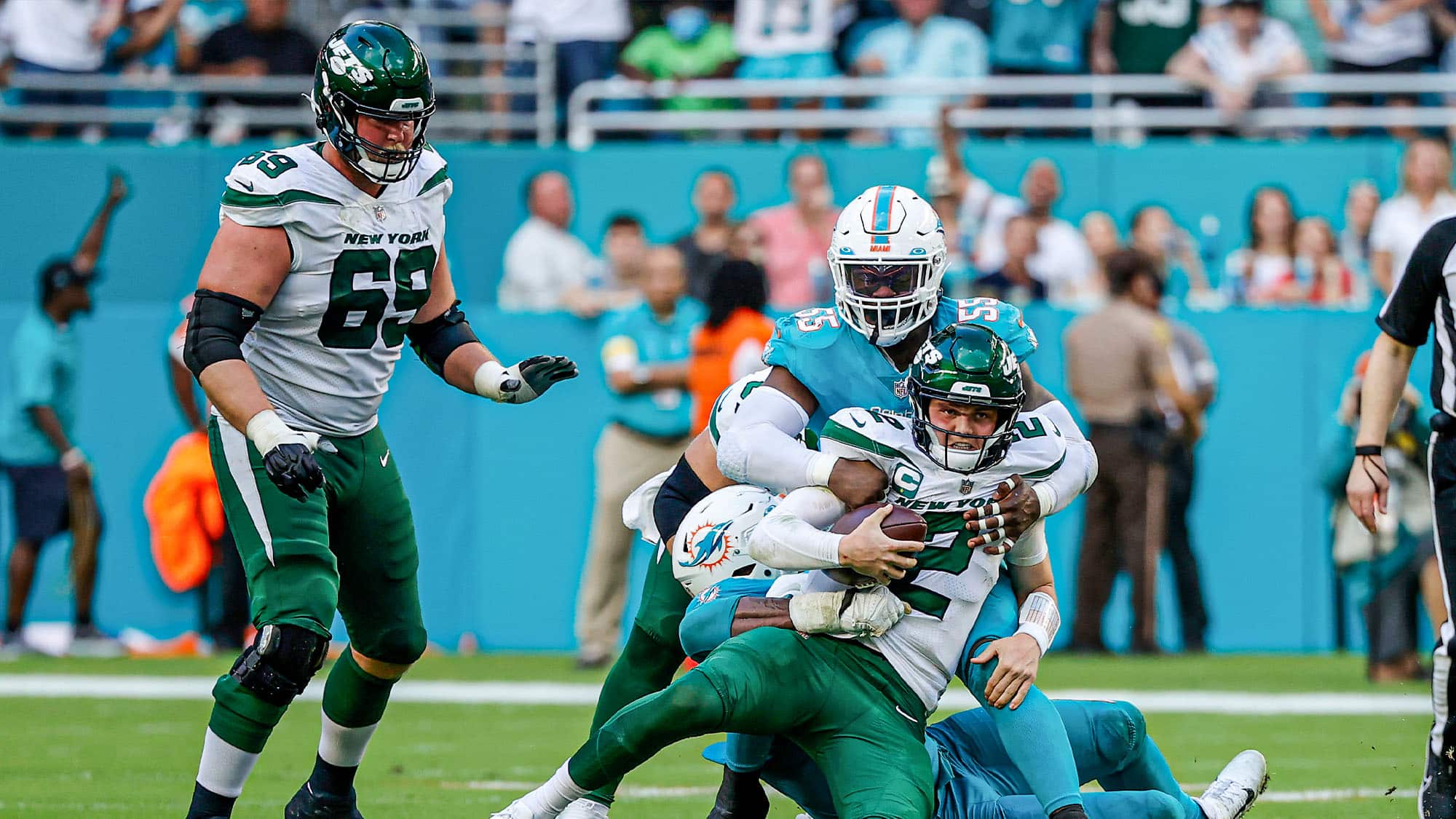New York Jets give Zach Wilson no chance against Dolphins
In most of Zach Wilson‘s games this year, his supporting cast gave him at least a decent chance to succeed.
Wilson’s trip to Miami was not one of those games.
While Wilson and the New York Jets‘ offense enjoyed a solid first half against the Dolphins, the offense was shut out in the second half largely due to an abysmal pass-protection performance that eliminated Wilson’s chances of making anything happen. Wilson was under constant duress and never got enough time and space to build upon the rhythm he established in the first half.
Wilson was pressured on 46.9% of his dropbacks in the game, the third-highest rate he has absorbed this season. He faced pressure on 15 of his 32 dropbacks, with most of those 15 pressures coming in the second half. Many of the pressures were instantaneous.
The atrocious outing was a big step backward for an offensive line that had been trending toward league-average with its improvements in recent weeks. While the unit has had some bad games this year, it was rarely awful to the point where it completely ruined the offense’s chances of succeeding. The last time it performed that poorly was probably way back in Week 1 against Carolina.
Here are the players who were most at fault for the pass-blocking collapse.
LT Conor McDermott
When it comes to good offensive linemen, you often do not feel their impact until they are not on the field.
That was the case in Miami. George Fant missed his first game of the season, and uncoincidentally, the Jets’ left tackle was consistently noticeable in the passing game for the first time – which, of course, is a bad thing.
Conor McDermott struggled mightily on Wilson’s blindside in relief of Fant. McDermott was credited with allowing two sacks, according to PFF. Fant, on the other hand, has allowed one sack all year.
In total, McDermott allowed three pressures, which is more than double Fant’s season average of 1.4 per game and equal to Fant’s worst single-game total this season.
McDermott also had a killer holding penalty on the Jets’ final drive of the game as they attempted to drive and tie the score.
RT Morgan Moses
Right tackle Morgan Moses tied McDermott for the Jets’ team lead with three pressures allowed. He played a large role in allowing Miami’s left defensive end, Emmanuel Ogbah, to tie his season-high with seven pressures.
This is Moses’ eighth game of the season allowing at least three pressures. For comparison’s sake, three pressures is Fant’s season-worst total, which he only hit once.
Moses has allowed 43 pressures this season (3.1 per game), ranking as the third-most among right tackles.
Play: 👉 the Jet X Offseason Simulator
RB Michael Carter
Michael Carter has been solid in pass protection throughout his rookie year, but he struggled in this one.
Carter was credited with allowing two sacks over eight snaps in protection (25.0% pressure rate). Entering the game, he had given up only two total pressures all season on 38 protection snaps (5.3% pressure rate).
TEs Tyler Kroft and Ryan Griffin
Tyler Kroft and Ryan Griffin each allowed one pressure over seven and five pass-blocking snaps, respectively, for a combined total of two pressures on 12 pass-blocking snaps. That’s a 16.7% pressure rate, which is more than double the typical average for tight ends (around 7%).
Griffin has allowed the second-most pressures among tight ends this season (8). He has also pass-blocked on the second-most snaps (75), but even so, his allowed pressure rate of 10.7% is still well above average.
Most tight ends who are relied upon to pass-block as often as Griffin are actually talented as blockers. For instance, the third-ranked tight end in pass-blocking snaps – Carolina’s Ian Thomas – has allowed only one pressure on 72 pass-blocking snaps (1.4% rate).
Mike LaFleur’s offensive scheme places a heavy blocking onus on the tight ends. With the Jets’ lack of talent at the tight end position, the bottom-tier Griffin has been forced to take on far more blocking reps than his lackluster blocking ability warrants, and New York has paid the price.


